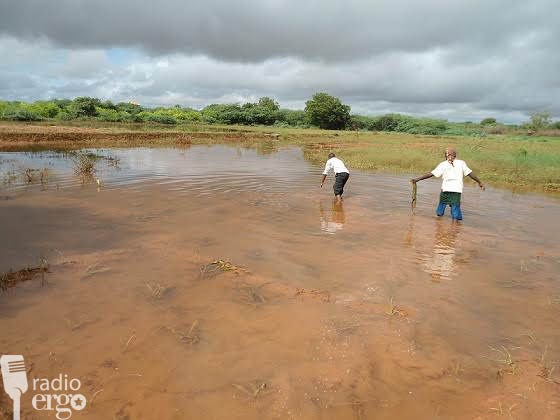
Friday May 24, 2024

Flood destroyed farms in Somalia/File Photo
(ERGO) – Farming families in Dhardhaar village in central Somalia’s Mudug region are struggling to recover from crop losses caused by flash flooding last year that came on top of years of devastating drought.
Abdi Isse Ereg was among the local farmers who planted in September 2023 when seasonal deyr rainfall arrived, giving hope that the long four-year drought was over.
However, torrential rains began on 25 October 2023 causing floods that wiped out all the newly planted crops on Abdi’s three hectare farm.
“You can understand what it’s like for someone who had planted his crops but lost them! We can only complain to God. We had high expectations of improving our lives but it didn’t happen,” he said.
Abdi has no alternative source of income and has had to depend on his relatives in Bandiradley town, who send him small amounts of food. He said they use the little food sparingly, cooking one meal a day for the family of 13.
The maize and beans he had stored from his last harvest has all run out.
He took loans from local businessmen in Bandiradley, 70 km southwest of Galkayo, but they refused any more credit when they realised his farm had failed. He owes $2,300 and is always being reminded about his debts.
“The loan repayment is long overdue. I used to tell them my farm was almost ready for harvest. But the business people want their money and I don’t have anything in my hands,” he said.
Abdi’s five years in farming have been blighted by climatic extremes and huge losses. The 12 goats he has left are mostly young and don’t meet market standards so he can’t sell them off.
Neighbouring farmer Hassan Adan Hashi is in a similar position.
“This disaster has affected our lives. We were poor farmers and our crops were uprooted in the floods while others were submerged in rainwater. Most of our crops were destroyed,” he said.
Hassan was hoping to make $2,000 from his farm after the expected harvest in January. Two other families related to him were also counting on the farm. They helped with the farm work and were waiting to get their share of the harvest.
Hassan has turned to construction work on a site five kilometres away from his house in Bandiradley, where he makes $14 for two days work a week.
“This work is hard but it is necessary since I have a family, it is upon me to take care of my family. I get to work early in the morning and we work until 1:00 pm, but still we don’t get work every day,” he complained.
He has debts of $1,700 at local stores and his family’s store of sorghum, maize and beans has already run out.
The head of the farmers’ association in Dhardhaar, Abdirashid Mohamed Hersi, said 51 farming families in the village lost their crops in the torrential rain and flash floods that nobody had been prepared for.
Most had used up the small amounts of food they had stored from the previous harvest that was reduced by the drought.
“The problem was two-fold, on one side the people didn’t have training on to how to deal with the floods and at the same time they were too poor to invest in systems to avert the flood effects. You can imagine how much this has affected them,” he said.